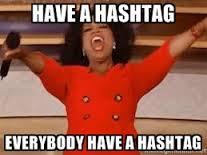Dear Hashtags That Should Really Be Sentences,
This is an intervention. Did you catch that? #thisisanintervention. We need to talk. You’ve come a long way in a short time, and I’m worried about you. Remember when hashtags were simple? #work. #mondays. #TGIF. An adjective here, an acronym there, nothing more committal than a proper noun. Things were cut and dry, we knew exactly how people felt about their weekends and life was simple. Until one day, someone tweeted “#fivebeersin” instead of “#drinks” and everything changed.
After that, everyone was convinced it had always been their destiny to be well-liked for creating long, clever hashtags. Of course hashtags existed to convey emotion and tell a story! Once the possibility presented itself, there was no going back. Suddenly, it was literally trending to cram multiple words together behind a pound symbol, and you were born: the unreadable hashtag. Tweets went from 90% update, 10% hashtag to 30% update, 70% hashtag. Some tweets were 100% hashtag, 80% of the time. (Source: Think about everyone you went to college with.) What was once intended to track data is now used ironically as a way to convey un-ironic feelings about mundane topics. We started sacrificing SEO for… I’m not exactly sure what. Popularity? Illegibility? A running inside joke with the Internet?
Eventually, you gave the 140-character limit the digital finger and broke free from the shackles of Twitter. Hashtags started popping up on Instagram and Facebook. Did the hashtaggery stop there? Of course not. Next, they crept into TV commercials. Is this some kind of innovative clickable television commercial of the future? Don’t make me laugh; we knew it wasn’t. Hashtags became longer and more ubiquitous, and you went mainstream. Texts, emails, Gchats, headlines, billboards, conversations, dreams and wedding invitations were no longer safe from you, the long, unreadable hashtag.
At some point, we equated hashtagging with some kind of super power, and this false sense of creativity went to our heads. “#baseball” became “#americaspastime” which eventually progressed to “#takemeouttotheballgame #caughtafoulballinthebleacherseatsbitches #basesloadedbottomoftheninth.” Unreadable hashtags are even more unreadable when the last letter of one word is the same as the first letter of the next word: “#whattimeissarahheadingout #notthatthatmatters #justthoughtidcheck.” Who talks like that? you might wonder. Nobody knows who these people are for certain because their phones are always blocking their faces, but chances are you can find them on Twitter.
Do you see what you’re doing? You’re holding us back from constructing real sentences. We’re forgetting how to use grammar. Instead, you’re helping us shave (apparently) precious characters off our status updates to make room for another (terribly) evocative hashtag that (we can only hope is) funnier and more unique than what our friends already posted. You’re making people compete over a keyboard symbol, and I’m sick of it.
Much like Instagram videos, I scroll past you in my feeds. Soon you’ll be a trend of the past and we’ll focus our attention on the next big thing, or a different symbol altogether. People will have a hashtag-shaped void in their hearts, but something newer will work its way in. Tweens will change the name of their dog from Hashtag back to One Direction. Subway will lament the billions of dollars they spent on a change order to add #eatfresh to sixteen thousand napkins. Twenty-somethings will cringe at the hashtag tattooed on their hip the same way now-thirty-somethings cringe at the mustache tattooed on their index finger. If you insist on hanging around, the least you can do is #UseInitialCapsForTheSakeOfLegibility. But then, you’ll run the risk of screwing up the line breaks on narrowly margined literary humor websites.
Sincerely,
Elizabeth Ann Entenman
















